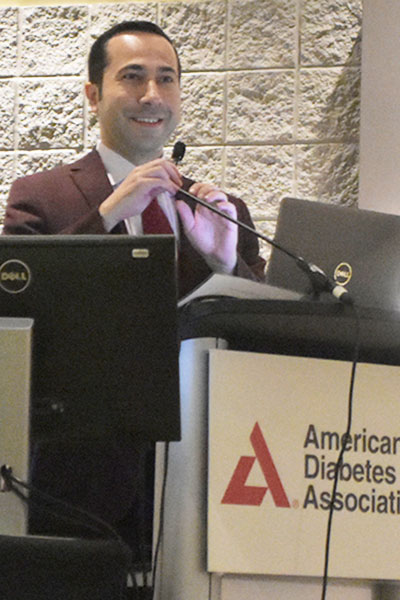In May 2024, the U.S. Department of Justice submitted a proposal to consider moving marijuana from a Schedule I to a Schedule III drug under the Controlled Substances Act (CSA). Marijuana has been classified as a Schedule I drug since the CSA was enacted in 1970, meaning it was deemed to have no medical value and high potential for use. As a result, restrictive guidelines have made studying the effects of cannabis challenging for investigators.
The Ask the Expert session The Highs and Lows of Cannabis Use in Diabetes—Behavioral and Psychosocial Considerations, held on Monday, June 24, analyzed a selection of the limited literature on the effects of cannabis on patients with diabetes. The session can be viewed on-demand by registered meeting participants on the virtual meeting platform. If you haven’t registered for the 84th Scientific Sessions, register today to access the valuable meeting content through Aug. 26.

Angela Bryan, PhD, Professor of Psychology and Neuroscience at the University of Colorado Boulder, is the leader of the Study on Nutrition, Insulin and Cannabis (SONIC) looking at the mechanism between cannabis and type 2 diabetes by examining physiological, behavioral, and inflammatory effects on patients. The data show several positive effects for those with type 2 diabetes who used cannabis compared with those who did not.
“On average, cannabis users, confirming prior evidence in the literature, tend to have a healthier circulating pro-inflammatory cytokine profile and they exercise more than nonusers,” Dr. Bryan said.
Day-level data also showed only slight differences in behavior, particularly diet, between those who use cannabis and those who do not. Among cannabis users, there were few behavioral differences between the days they used cannabis and the days they abstained.
Since inflammatory shifts are associated with the development of insulin resistance, it seemed a reasonable assumption that cannabis might affect patients’ insulin sensitivity levels, Dr. Bryan noted. The data told a different story.
“We saw absolutely no effects of group, time, or group-by-time interaction on the Matsuda Index of insulin sensitivity,” Dr. Bryan said.

Halis K. Akturk, MD, Associate Professor of Medicine and Pediatrics at the Barbara Davis Center for Diabetes, University of Colorado, highlighted some of the “lows” that can accompany cannabis use for patients with type 1 diabetes.
The primary challenge Dr. Akturk highlighted was distinguishing symptoms caused by cannabis use versus those directly related to patients’ diabetes. For example, cannabis hyperemesis syndrome (CHS) is common in adults with type 1 diabetes but is often misdiagnosed as diabetes-related gastroparesis.
“Younger age, less duration of diabetes, and concomitant cannabis use with gastrointestinal (GI) symptoms are in favor of CHS,” Dr. Akturk explained.
Similarly, cannabis use is associated with an increased risk of inducing symptoms that appear similar to diabetes-related ketoacidosis (DKA). Consequently, many cannabis users with type 1 diabetes who present with DKA-like symptoms are often misclassified and placed in hospital settings. Hyperglycemic ketosis related to CHS (HK-CHS) is a new term suggested to apply to cannabis users with type 1 diabetes who exhibit atypical lab results that could be misread as DKA.
Dr. Akturk published a paper in 2022 on significant biomarkers to discern HK-CHS versus DKA with impressive accuracy. He shared that higher bicarbonate (HCO3) and pH levels are the critical identifying signifiers.
“If the pH is more than 7.4 and HCO3 more than 15 [mEq/L], it will identify 96 percent of the patients whose urine drug screen is positive for cannabis,” Dr. Akturk said.

Jay H. Shubrook, DO, Professor of the Primary Care Department at Touro University California, provided a general overview of the current landscape of cannabis use. In the United States, 38 states and three territories have legalized medicinal marijuana, and 24 states permit the recreational use of marijuana.
Cannabis has been widely adopted for medicinal use to calm muscle spasticity (in patients with multiple sclerosis, for example) and to safely relieve some of the most debilitating symptoms of cancer, including weight loss, nausea, and various forms of pain.
Dr. Shubrook said he usually advises patients who use cannabis to avoid methods that involve inhalation of smoke due to overall pulmonary risk and opt for alternative methods of cannabis ingestion such as oils, topicals, or edibles. He also noted that too much use can lead to CHS, which can lead to recurring and severe vomiting. Dr. Shubrook was less concerned with how cannabis affects blood glucose levels in patients with diabetes.
“As I think about all the other substances that someone may be ingesting—medicinally, prescribed, recreationally—cannabis seems to have a lot less effect than many others,” he said.
Get On-Demand Access to the Scientific Sessions
There is still time to register for on-demand access to learn about the latest advances in diabetes research, prevention, and care presented at the 84th Scientific Sessions. Select session recordings will be available through Aug. 26.